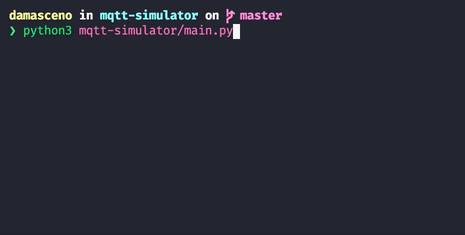Easy-to-configure MQTT simulator written in Python 3 to simulate the sending of JSON objects from sensors or devices to a broker.
Features • Getting Started • Configuration • Authors
- Small and easy-to-configure simulator for publishing data to a broker
- Configuration from a single JSON file
- Connection on pre-defined fixed topics
- Connection on multiple topics that have a variable id or items at the end
- Random variation of data generated according to configuration parameters
- Python 3 (with pip)
To install all dependencies with a virtual environment:
python3 -m venv venv
source venv/bin/activate
pip3 install -r requirements.txtThe default simulator settings can be changed in the config/settings.json file.
python3 mqtt-simulator/main.pyRuns the simulator according to the settings file.
The terminal will show the simulator event log.
Optionally, you can pass a flag with the path to settings file:
python3 mqtt-simulator/main.py -f <path/settings.json>-
The
config/settings.jsonfile has three main configuration parameters:{ "BROKER_URL": "mqtt.eclipse.org", "BROKER_PORT": 1883, "TOPICS": [ ... ] }Key Type Description Required BROKER_URLstring The broker URL where the data will be published yes BROKER_PORTnumber The port used by the broker yes TOPICSarray<Objects> Specification of topics and how they will be published yes -
The key TOPICS has a array of objects where each one has the format:
{ "TYPE": "multiple", "PREFIX": "temperature", "RANGE_START": 1, "RANGE_END": 2, "TIME_INTERVAL": 25, "RETAIN_PROBABILITY": 0.5, "DATA": [ ... ] }Key Type Description Required TYPEstring It can be "single","multiple"or"list"yes PREFIXstring Prefix of the topic URL, depending on the TYPEit can be concatenated to/<id>or/<item>yes LISTarray<any> When the TYPEis"list"the topic prefix will be concatenated with/<item>for each item in the arrayif TYPEis"list"RANGE_STARTnumber When the TYPEis"multiple"the topic prefix will be concatenated with/<id>whereRANGE_STARTwill be the first numberif TYPEis"multiple"RANGE_ENDnumber When the TYPEis"multiple"the topic prefix will be concatenated with/<id>whereRANGE_ENDwill be the last numberif TYPEis"multiple"TIME_INTERVALnumber Time interval in seconds between submissions towards the topic yes RETAIN_PROBABILITYnumber Number between 0 and 1 for the probability of the previous data being retained and sent again yes DATAarray<Objects> Specification of the data that will form the JSON to be sent in the topic yes -
The key DATA inside TOPICS has a array of objects where each one has the format:
{ "NAME": "temperature", "TYPE": "float", "MIN_VALUE": 30, "MAX_VALUE": 40, "MAX_STEP": 0.2 }Key Type Description Required NAMEstring JSON property name to be sent yes TYPEstring It can be "int","float"or"bool"yes MIN_VALUEnumber Minimum value that the property can assume If TYPEis different from"bool"MAX_VALUEnumber Maximum value that the property can assume If TYPEis different from"bool"MAX_STEPnumber Maximum change that can be applied to the property from a published data to the next If TYPEis different from"bool"


